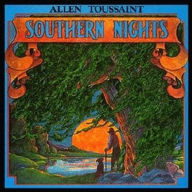Southern Nights Allen Toussaint Artist
Southern Nights Allen Toussaint Artist
{|Allen Toussaint|} produced a kind of masterpiece with his first {|Reprise|} album, {|Life, Love and Faith|}, finding previously unimagined variations on his signature {|New Orleans R&B|} sound. For its 1975 sequel, {|Southern Nights|}, he went even...
Read more
{|Allen Toussaint|} produced a kind of masterpiece with his first {|Reprise|} album, {|Life, Love and Faith|}, finding previously unimagined variations on his signature {|New Orleans R&B|} sound. For its 1975 sequel, {|Southern Nights|}, he went even further out, working with producer {|Marshall Sehorn|} to create a hazy vague concept album that flirted with neo-psychedelia while dishing out his deepest {|funk|} and sweetest {|soul|}. It's a bit of an unfocused album, but that's largely due to the repeated instrumental filler, usually based on the theme of the title song, that pops up between every two or so songs, undercutting whatever momentum the album is building. That, along with a song or two that are merely average {|Toussaint|}, prevents {|Southern Nights|} from being a full-fledged masterpiece, but it comes close enough to that level of distinction anyway due to the brilliance of its best songs. There is, of course, {|Southern Nights,|} which {|Glen Campbell|} later took to the top of the charts, but it's nearly unrecognizable here, given a swirling, trippy arrangement that plays like a heat mirage. It's rivalled by the exquisite {|What Do You Want the Girl to Do?,|} later covered by both {|Bonnie Raitt|} and {|Boz Scaggs|}, neither of which equal the beautiful, sighing resignation of {|Toussaint|}'s impeccable vocal performance. Then, there are the songs that weren't covered, but should have been, like the nearly anthemic {|Back in Baby's Arm,|} the rolling, catchy {|Basic Lady,|} the stately {|You Will Not Lose,|} or the steady-grooving end-of-the-night {|When the Party's Over.|} Then, there are the songs that perhaps only {|Toussaint|} could sing, given their complex yet nimble grooves: witness how {|Country John|} seems like a simple, straight-ahead New Orleans raver but really switches tempo and rhythm over the course of the song, or how the monumental {|Last Train|} builds from its spare, funky opening to a multi-layered conclusion boasting one of {|Toussaint|}'s best horn arrangements and vocal hooks. These disparate sounds may not be tied together by the interludes, as they were intended, but they nevertheless hold together because they're strong songs all bearing {|Toussaint|}'s unmistakable imprint. They're so good that they nearly knock the near of off the near-masterpiece status for {|Southern Nights|}, and they're the reason why the album should be a part of any serious {|soul|} collection. ~ Stephen Thomas Erlewine
Less





